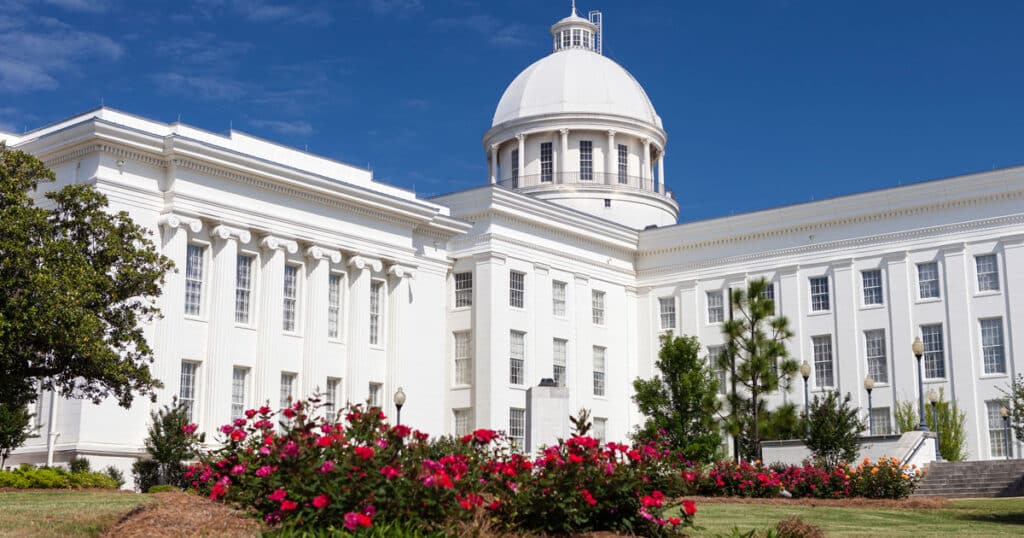
11th Circuit Reinstates Alabama Law Protecting Minors From Gender-Transition Hormones
The U.S. Court of Appeals for the 11th Circuit on Monday vacated a preliminary injunction against Alabama’s Vulnerable Child Compassion and Protection Act, which had blocked the section of the law protecting minors from puberty blockers and cross-sex hormones.
The unanimous decision denied that the law “amounts to a sex-based classification” and found no “constitutional right to treat [one’s] children with transitioning medications subject to medically accepted standards.”
Alabama’s law protecting minors from gender-transition hormone treatments was partially blocked on May 13, 2022, days after it went into effect.
In that order, U.S. District Judge Liles Burke reached the conclusion that the plaintiffs were “substantially likely to succeed” on two claims, substantive due process and equal protection—both under the 14th Amendment—and thus met the criteria for a preliminary injunction. But the appeals court disagreed on both counts.
The substantive due process count is an argument over the scope of parental rights. The lower court found a “right to treat [one’s] children with transitioning medications subject to medically accepted standards,” which it said fell “under the broader, recognized fundamental right to ‘make decisions concerning the care, custody, and control of [one’s] children.’”
The appeals court objected to this logical leap, faulting the lower court for not performing “any historical inquiry specifically tied to the particular alleged right at issue.”
“Courts must look to whether the right is ‘deeply rooted in [our] history and tradition’ and ‘essential to our Nation’s ‘scheme of ordered liberty,’” said the 11th Circuit, citing the Supreme Court’s Dobbs decision. “But the use of these medications in general—let alone for children—almost certainly is not ‘deeply rooted’ in our nation’s history and tradition.”
The court pointed out that the earliest use of puberty blockers and cross-sex hormones came decades after the 14th Amendment was adopted. While not denying the fundamental nature of parental rights, the court cited precedent to emphasize that “a substantive due process analysis must focus on the specific right asserted, rather than simply rely on a related general right.”
Consequently, the court applied the deferential “rational basis” test to Alabama’s law and considered the law would likely succeed in passing the test.
“First, the record evidence is undisputed that the medications at issue present some risks. As the district court recognized, these medications can cause ‘loss of fertility and sexual function,’” it noted. “Second, there is at least rational speculation that some families will not fully appreciate those risks and that some minors experiencing gender dysphoria ultimately will desist and identify with their biological sex.”
The equal protection count boiled down to whether the law discriminated based on sex or a sex-based category.
The lower court found that the law “classifies on the basis of gender nonconformity and therefore classifies on the basis of sex,” applying the Bostock decision’s redefinition of sex. But the appellate court agreed with Alabama that the law “classifies on the bases of age and procedure, not sex or gender nonconformity, and is therefore not subject to any heightened scrutiny.”
The 11th Circuit also rejected other theories raised by the plaintiffs and the U.S. Department of Justice, which intervened against Alabama’s law, to establish an equal protection violation.
Plaintiffs argued that the law “directly classifies on the basis of sex because it ‘uses explicitly sex-based terms.’” The court rejected this argument for two reasons. First, the law “establishes a rule that applies equally to both sexes.”
Second, “the statute refers to sex only because the medical procedures that it regulates—puberty blockers and cross-sex hormones as a treatment for gender dysphoria—are themselves sex-based. … For that reason, it is difficult to imagine how a state might regulate the use of puberty blockers and cross-sex hormones for the relevant purposes in specific terms without referencing sex in some way.”
Meanwhile, the DOJ argued that discriminating on the basis of gender identity amounted to discriminating on the basis of sex, based upon Bostock’s reasoning. But the court pointed out that the reasoning of Bostock was specific to the text of Title VII, which prohibits discrimination in unemployment law.
“The Equal Protection Clause contains none of the text that the Court interpreted in Bostock. It provides simply that ‘[n]o State shall . . . deny to any person within its jurisdiction the equal protection of the laws,’” it added. “Because Bostock therefore concerned a different law (with materially different language) and a different factual context, it bears minimal relevance to the instant case.”
The DOJ raised another precedent, Brumby, which “concerned gender stereotyping in the context of employment discrimination.” The court distinguished the Alabama law because it “does not further any particular gender stereotype. Insofar as [the challenged portion of Alabama’s law] involves sex, it simply reflects biological differences between males and females, not stereotypes associated with either sex.”
The DOJ also contended the law discriminates against gender-nonconforming individuals because it “restricts a specific course of medical treatment that, by the nature of things, only gender nonconforming individuals may receive.”
To counter this, the 11th Circuit again cited Dobbs, “Just last year, the Supreme Court explained that ‘[t]he regulation of a medical procedure that only one sex can undergo does not trigger heightened constitutional scrutiny unless the regulation is a “mere pretex[t] designed to effect an invidious discrimination against members of one sex or the other.”’”
The DOJ also argued that transgender individuals constituted a “quasi”-protected class under the equal protection clause, but the court responded, “‘We have grave “doubt” that transgender persons constitute a quasi-suspect class,’ distinct from sex, under the Equal Protection Clause.”
In conclusion, the 11th Circuit said the controversy at issue properly belonged in the political sphere, not the judicial sphere.
“This case revolves around an issue that is surely of the utmost importance to all of the parties involved: the safety and wellbeing of the children of Alabama,” it said. “But it is complicated by the fact that there is a strong disagreement between the parties over what is best for those children. Absent a constitutional mandate to the contrary, these types of issues are quintessentially the sort that our system of government reserves to legislative, not judicial, action.”
Then it summed up the case: On substantive due process, “the district court divined” a “right to ‘treat [one’s] children with transitioning medications subject to medically accepted standards’”—“without adequate historical support.”
On equal protection, “the district court determined that the law classifies on the basis of sex, when in reality the law simply reflects real, biological differences between males and females and equally restricts the use of puberty blockers and cross-sex hormone treatment for minors of both sexes.”
The 11th Circuit’s decision in favor of Alabama could hold major implications for the other states in its jurisdiction, Florida and Georgia.
In Florida, a federal judge issued a preliminary injunction against the state’s law protecting minors from gender-reassignment hormone treatments on June 6. In Georgia, a federal judge issued a preliminary injunction against a similar law on Sunday.
In both cases, plaintiffs raised the same constitutional questions addressed by the 11th Circuit—substantive due process and equal protection. And, in both cases, the lower court applied heightened scrutiny (the Georgia ruling only addressed the merits of the equal protection claim), instead of the rational basis test stipulated by the 11th Circuit.
The disparate outcomes could lead either the 11th Circuit or the respective district courts to revise their decision in light of the new precedent.
Alabama’s law protecting minors from gender-reassignment procedures is the third to win a preliminary victory at the circuit court level.
In July, the U.S. Court of Appeals for the 6th Circuit overturned a lower court ruling enjoining Tennessee’s SAFE Act-style law (that decision was cited by the 11th Circuit).
Days later, a district judge in Kentucky, who had just enjoined that state’s law, lifted his injunction in light of the Tennessee precedent, and the 6th Circuit upheld his decision.
By lifting the injunction against Alabama’s law, the 11th Circuit became the second appeals court to rule on the merits in favor of laws protecting minors from gender-reassignment procedures.
Originally published by The Washington Stand



